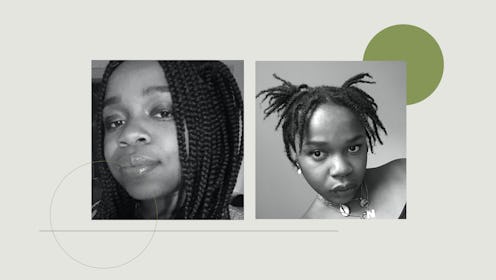Beauty
What I Learnt About Loc'ing & Accepting My Natural Hair During Lockdown
"When the world halted, and we stayed indoors, my thoughts on afro hair and beauty standards began to shift."

While being able to remain at home and having a home to remain in during the coronavirus outbreak is a privilege, it's hard to deny that lockdown has been a challenge. It tore us away from the comforts of everyday life — the joy of sharing a pint with friends or celebrating a birthday with family. Yet for many of us, the experience has also given us the chance to pause and reflect, to take stock of what matters most. In What I Learnt In Lockdown, writers share what this period has meant for them and what lessons they'll take away as we all begin to emerge from our COVID-19 cocoons.
I’m a serial braider. It’s been my go-to style for years now. Box braids, kinky twists, faux locs, you name it, I’ve tried it. And then the pandemic hit, uprooting our lives as we knew it and eventually leading me to take my braids out. Little did I know that it would probably be the last ever time I wore my hair in braids.
In theory, I loved afro hair. I understood the importance of my hair as a signifier of my Blackness and the politics our afro hair holds without us even trying. But, in reality, I wasn’t always in love with my hair. I would be lying if I said I didn’t find it hard work, both emotionally and aesthetically. I struggled to keep up with the changing goalposts of the natural hair movement and detested spending hours styling it and buying expensive products.
Black women already spend on average three times more on haircare than their white counterparts. And some styles are literally killing us, with chemical relaxers and dyes being linked to higher rates of breast cancer in Black women.
Hair just wasn't as simple for me as I wished it was, so I found it easier to push down any resentment and cover it up with years of long braids.
I struggled to keep up with the changing goalposts of the natural hair movement and detested spending hours styling it and buying expensive products.
But when the world halted, and we stayed indoors, my thoughts on afro hair and beauty standards began to shift. Was I doing braids because I liked them, or because everyone else liked them, I asked myself? What would it be like to let go and stop defining my self-worth by how my hair looked? Did I actually like myself and who I was beyond aesthetics?
I watched a video by comedian and content creator Mayowa Osinubi on why she started loc'ing her hair, how it changed her life, and how letting her hair grow in it’s most natural state gave her validation and confidence in herself from herself – she no longer needed to fit herself in the box of conventional beauty.
I wanted in, so I finally decided to get locs, a last-ditch attempt to fully fall in love with my hair in its most natural state. And , if I didn’t like it, at least I wasn’t going anywhere anytime soon.
I knew I had always wanted to loc my hair, but each time I found reasons not to. What if it didn’t suit me? Would locs be too limiting? What if I got bored and wanted to do another style? What if I struggled in my career? Would I suffer from more microaggressions?
I finally decided to get locs, a last-ditch attempt to fully fall in love with my hair in its most natural state.
Suddenly, when the pandemic came, all those reasons felt obsolete, my priorities had dramatically altered and I found clarity for the first time. It didn’t matter if my edges were laid or my braids were swinging down my back, now it mattered if I felt happy or anxious, when I was cooking dinner, and if I was sleeping well.
So I did my research, spending hours on YouTube watching Black women tending to their hair. I found out why Black people don’t call this style dreadlocks but instead “locs” because of the implications of the word “dread.” I found out that, for Rastafarians, locs are spiritual – it’s a lifestyle, not just a hairstyle, and it’s one of the oldest in the world. I learnt that there are so many ways to loc your hair, from the neat sisterlocks all the way to freeform locs. In the quietness of lockdown, physically separated from my community, I found a new one online.
Although it’s only been two months, I’m already more in love with my hair than I have ever been before. I relish not having to crane my neck to stop it from getting wet in the shower; I don’t recoil in horror when it starts to rain and I have no brolly; and so far I’ve barely spent any money on my hair.
I have found freedom and liberation through my hair in a time when our freedom has been stripped away.
Looking back, it's clear to me why this decision about my hair coincided with one of the biggest global events of my life. This has been a defining moment in so many of our lives, and while it’s been difficult, and of course I am privileged to be healthy and safe, when will we be given this kind of pause in our lives again? Taking time to decentre my understanding of my hair and what it means to me has really changed the way I view myself. Through this experience, I have found freedom and liberation in a time when our freedom has been stripped away – and I'll always be grateful for that.